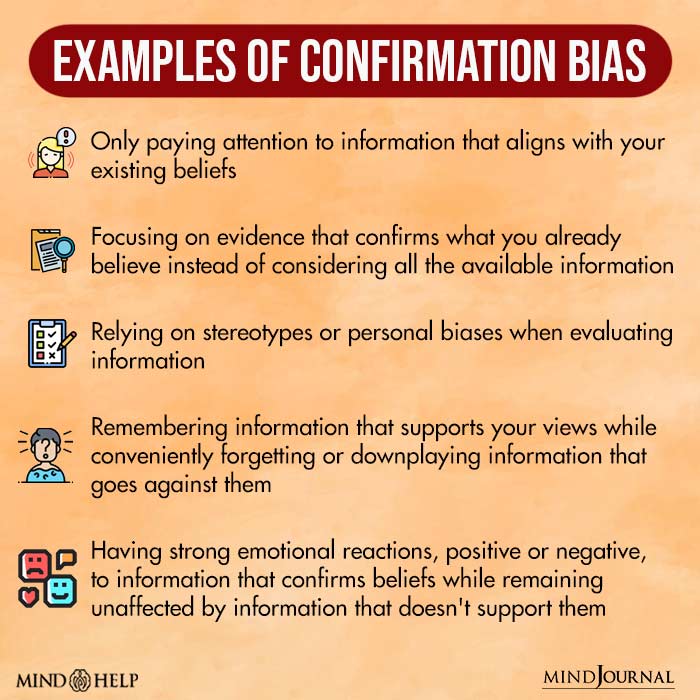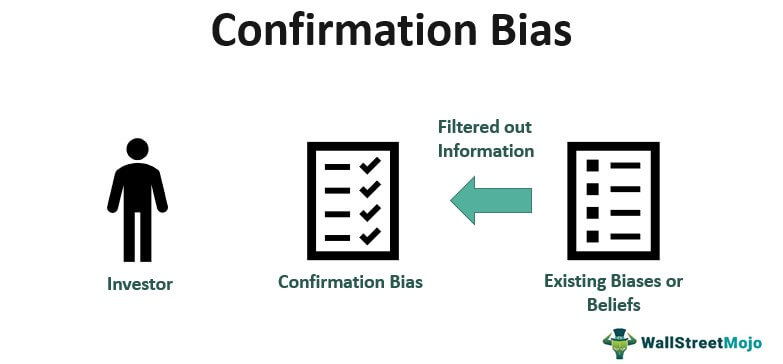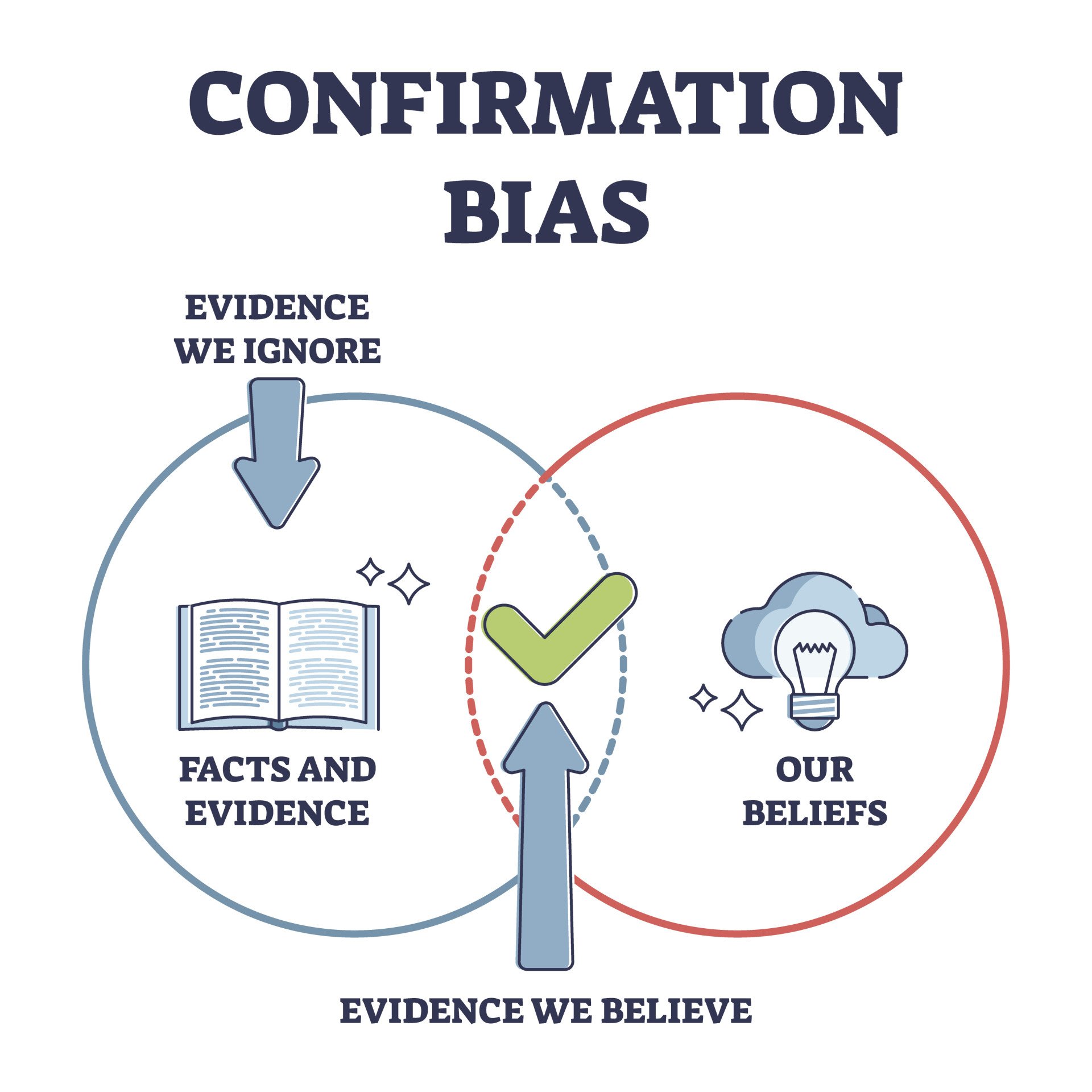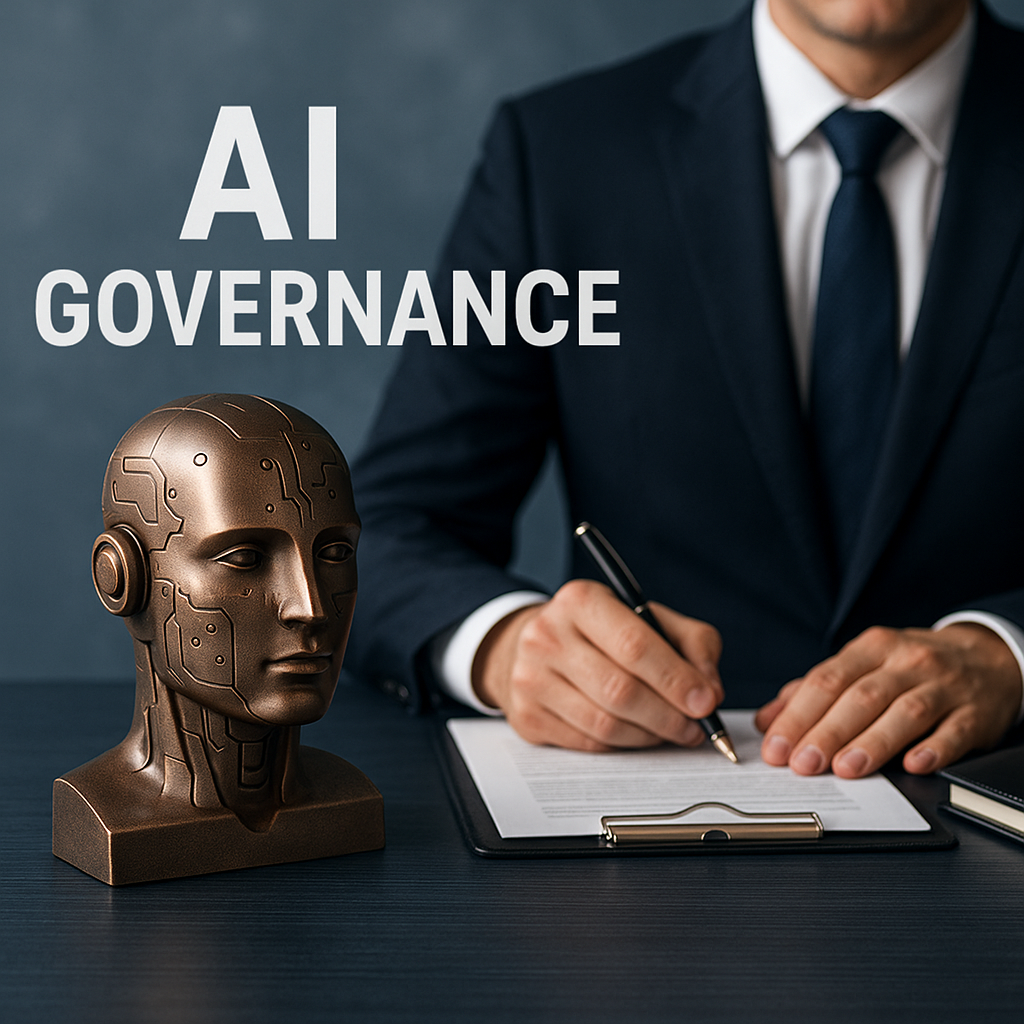
Introduction
Confirmation bias is a cognitive bias that affects our decision-making process and influences our perception of reality. It is important to be aware of this bias and consistently challenge our assumptions to make better, more objective decisions.
Definition and explanation of confirmation bias
Confirmation bias is the tendency to favor information that confirms our preexisting beliefs or hypotheses while disregarding or downplaying contradictory evidence. This bias can prevent us from considering alternative perspectives, distorting our understanding of the world.
Confirmation bias is when we look for information that agrees with what we already believe, interpret unclear information to fit our existing ideas, or spend time with people who have the same views as us and make us feel right.
Challenging confirmation bias is crucial as it allows us to make more accurate assessments and avoid erroneous judgments. To overcome confirmation bias and better understand complex issues, we need to actively seek different perspectives, carefully evaluate new information, and be willing to change our views.
Recognizing and addressing confirmation bias requires self-awareness and intellectual humility. It encourages us to engage in constructive dialogue, consider multiple viewpoints, and base our decisions on evidence rather than predetermined biases.
Challenging confirmation bias is important for improving critical thinking, intellectual growth, and making informed decisions that aren’t influenced by personal biases.

Understanding Confirmation Bias
Confirmation bias refers to the tendency of individuals to seek and interpret information in a way that confirms their preexisting beliefs or assumptions. This cognitive bias can significantly impact decision-making processes, leading to errors in judgment and flawed conclusions.
How confirmation bias affects decision-making
When individuals are influenced by confirmation bias, they tend to focus on information supporting their beliefs while ignoring or downplaying contradictory evidence. This selective processing of information can hinder objectivity and prevent individuals from considering alternative perspectives or potential risks.
Confirmation bias can make people overly confident in their decisions because they tend to look for and believe information supporting their ideas. This can result in poor choices, missed opportunities, and an inability to adapt to changing circumstances.
The psychology behind confirmation bias
Confirmation bias is rooted in various psychological factors, including cognitive dissonance and the need for cognitive consistency. Humans naturally seek to maintain a sense of internal harmony, which can lead to the rejection of information that challenges their beliefs.
To mitigate the negative effects of confirmation bias, individuals must consciously challenge their assumptions and actively seek out diverse viewpoints. By embracing cognitive diversity and considering alternative perspectives, individuals can make more informed decisions and avoid the pitfalls of biased thinking.

Examples of Confirmation Bias
Confirmation bias is when people look for, understand, and remember information in a way that supports what they already think. It can profoundly impact decision-making, as it leads individuals to ignore or dismiss evidence that contradicts their beliefs. Recognizing and challenging confirmation bias is crucial for making informed and unbiased decisions.
Real-life examples of confirmation bias in action
- Political Beliefs: People tend to selectively consume news and information that aligns with their political beliefs, reinforcing existing biases.
- Confirmation Bias in the Workplace: Managers may favor employees who confirm their prior assumptions about an individual’s performance, even if contradictory evidence suggests otherwise.
Case studies and experiments showcasing confirmation bias
- The Halo Effect: A study found that attractive people were more likely to be perceived as intelligent, friendly, and competent, emphasizing how initial impressions can influence subsequent judgments.
- The Framing Effect: Shows that how information is presented can affect decision-making. When a risky option is shown as a potential gain, people are more likely to choose it. However, when the same option is framed as a loss, people tend to avoid it.
Being aware of confirmation bias allows individuals to challenge their assumptions and seek out diverse perspectives and evidence. Individuals can make more well-rounded and informed decisions by consciously engaging in critical thinking and considering alternative viewpoints.

Consequences of Confirmation Bias
Confirmation bias is a cognitive bias that affects our decision-making process and how we perceive the world around us. It occurs when we selectively seek information confirming our existing beliefs while ignoring or dismissing evidence that contradicts them. This bias can have significant consequences in both personal and professional aspects of our lives.
Negative impact on critical thinking and problem-solving
Individuals subject to confirmation bias tend to limit their exposure to alternative viewpoints and information. This hinders critical thinking and can prevent individuals from making well-informed decisions. Instead of objectively evaluating all available evidence, confirmation bias reinforces existing beliefs, which can hinder problem-solving abilities and limit creativity.
Effects on personal and professional relationships
Confirmation bias can also strain personal and professional relationships. When individuals only seek information that aligns with their beliefs, it can lead to closed-mindedness and a lack of empathy towards others with differing opinions. This can create friction and hinder effective communication and collaboration.
In order to overcome confirmation bias, it is crucial to challenge our assumptions and actively seek out information that may contradict our beliefs. By remaining open-minded and considering multiple perspectives, we can enhance our critical thinking skills, strengthen relationships, and make more informed decisions.
Overcoming Confirmation Bias
Confirmation bias is a common psychological tendency where people seek information confirming their preexisting beliefs and ignore or dismissing evidence that contradicts them. This bias can hinder decision-making, limit critical thinking, and negatively impact problem-solving abilities. It is vital to challenge assumptions and actively seek diverse perspectives to overcome confirmation bias.
Recognizing and acknowledging biases
The first step in challenging confirmation bias is recognizing its existence. Being aware of our predispositions and acknowledging our biases is essential to overcoming them. By understanding that we are susceptible to selectively interpreting information, we can take deliberate actions to counteract this cognitive bias.
Strategies for challenging assumptions and seeking diverse perspectives
One effective strategy is seeking out alternative viewpoints. Engaging with individuals with different opinions can broaden our understanding and challenge our assumptions. Additionally, questioning our beliefs and actively searching for contradictory evidence can help us overcome confirmation bias. Seeking feedback from diverse sources and conducting thorough research are also valuable in challenging our assumptions.
By challenging our assumptions and actively seeking diverse perspectives, we can minimize the impact of confirmation bias on decision-making processes. This approach fosters critical thinking, enhances problem-solving abilities, and promotes well-rounded decision-making that takes into account a broader range of information and perspectives.

The Role of Critical Thinking
Confirmation bias is a cognitive bias that happens when people seek, interpret, and remember information in a way that supports their pre-existing beliefs. It is a prevalent human tendency and can hinder objectivity and rational decision-making. Understanding confirmation bias is crucial for informed decision-making and avoiding flawed judgments.
Developing Critical Thinking Skills to Combat Confirmation Bias
- Question Your Assumptions: Be aware of your biases and question your assumptions regularly. Be open to challenging your own beliefs and exploring alternative viewpoints.
- Seek Diverse Perspectives: Surround yourself with individuals who have different opinions and perspectives. Engage in constructive conversations and actively listen to opposing viewpoints.
- Stay Informed: Actively seek out diverse sources of information to avoid confirmation bias. Read from different perspectives, consider multiple angles, and fact-check claims before accepting them.
Importance of Evidence-Based Reasoning
Evaluate Evidence: Rely on evidence-based reasoning rather than personal beliefs or anecdotes. Look for reliable sources, scientific studies, and expert opinions to make well-informed decisions.
Be Skeptical: Develop a healthy skepticism towards information that aligns too well with your pre-existing beliefs. Look for contrary evidence or alternative explanations to avoid falling into the trap of confirmation bias.
By developing critical thinking skills and practicing evidence-based reasoning, individuals can overcome confirmation bias and make more objective decisions based on facts rather than personal biases.

Avoiding Confirmation Bias in the Media
Confirmation bias is the tendency to seek information confirming our existing beliefs while ignoring or dismissing evidence that challenges them. In today’s media landscape, it is important to question our assumptions and avoid confirmation bias when accessing news and information.
Media’s role in perpetuating confirmation bias
The media plays a significant role in perpetuating confirmation bias. News outlets and social media algorithms often personalize our content based on our browsing history and online behavior, creating echo chambers where we are constantly exposed to information that aligns with our preconceived notions. This reinforcement can lead to a distorted perception of reality, hindering our ability to assess different perspectives critically.
Tips for consuming news and information critically
To avoid confirmation bias, it is essential to approach news and information with a critical mindset. Here are some tips:
- Diversify your sources: Seek out news from various outlets with different perspectives to better understand the topic.
- Fact-check: Verify the information you come across by consulting reliable sources or fact-checking organizations.
- Question your biases: Be aware of your beliefs and challenge them regularly. Ask yourself if you are seeking information that confirms your beliefs or are open to considering alternative viewpoints.
- Engage in constructive conversations: Engage in respectful discussions with people with different opinions. This can broaden your perspectives and expose you to new ideas.
We can better understand the world around us by questioning our assumptions and considering different viewpoints, which helps us overcome confirmation bias.
Confirmation Bias in the Workplace
Confirmation bias is a mental bias that influences decision-making. It makes people look for, understand, and remember information that supports their existing beliefs, while disregarding evidence that contradicts them.In the workplace, confirmation bias can have significant consequences for the quality of decisions made and the overall productivity of a team or organization.
How confirmation bias can impact decision-making in a professional setting
- Limiting perspective: Confirmation bias can limit access to diverse perspectives and alternative ideas. When individuals only seek out information that agrees with their assumptions, they miss opportunities for innovation and problem-solving.
- Reduced objectivity: Confirmation bias can lead to biased decision-making as individuals cherry-pick data to support their preconceived notions. This can undermine the fairness and accuracy of decisions made in the workplace.
- Poor conflict resolution: Confirmation bias can hinder effective conflict resolution as individuals become less open to considering different viewpoints or finding common ground.
Creating an inclusive and diverse work environment
To combat confirmation bias in the workplace, it is crucial to promote inclusivity and diversity. Encouraging open dialogue, actively seeking diverse perspectives, and fostering a culture that challenges assumptions can help mitigate the negative effects of confirmation bias and improve decision-making processes within an organization. By valuing diverse viewpoints and challenging assumptions, companies can drive innovation, enhance problem-solving capabilities, and foster a more inclusive work environment.

Confirmation Bias: Why You Need to Challenge Your Assumptions
Confirmation bias is a cognitive bias where people seek out and interpret information in a way that confirms their existing beliefs or assumptions. This can lead to a distorted view of reality and prevent individuals from considering alternative perspectives or challenging their own assumptions.
Challenging your assumptions and overcoming confirmation bias is crucial to make well-informed decisions and foster intellectual growth. Here are key points to consider:
- Broaden Your Perspective: Challenging assumptions allows you to see different angles and comprehensively understand a situation. This can lead to innovation, problem-solving, and better decision-making.
- Avoid Missed Opportunities: Confirmation bias can limit your consideration of alternative options or solutions. By challenging assumptions, you open yourself up to new possibilities and avoid missing out on valuable opportunities.
- Foster Growth: Challenging assumptions promote intellectual growth and personal development. It encourages critical thinking, creativity, and adapting to new situations.
- Build Stronger Relationships: Overcoming confirmation bias enables you to listen and understand others’ perspectives. This strengthens relationships, fosters empathy, and promotes collaboration.
It is essential to recognize and overcome confirmation bias for personal and professional growth. By challenging assumptions, being open-minded, and seeking diverse perspectives, you can make informed decisions and contribute to a more inclusive and progressive society.
Summary of the importance of challenging assumptions and overcoming confirmation bias
Challenging assumptions and overcoming confirmation bias is crucial for making well-informed decisions, broadening perspectives, avoiding missed opportunities, fostering personal growth, and building stronger relationships.
Final thoughts and call to action
To overcome confirmation bias, make a conscious effort to challenge your assumptions regularly. Seek out diverse perspectives, engage in critical thinking, and be open to alternative viewpoints. Doing so can expand your knowledge, make better decisions, and contribute to a more open-minded and inclusive world.




